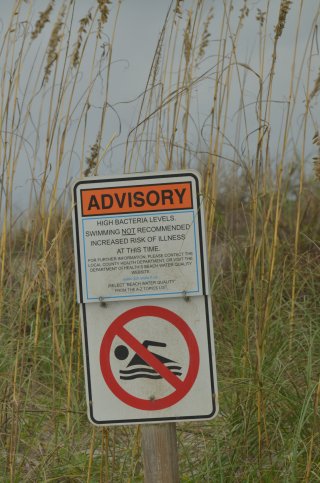What Affects Human Health at the Beach
Swimming at beaches with pollution in the water or in the sand can make you ill. The U.S. Environmental Protection Agency supports local and state efforts to protect and clean up beaches. The EPA also supports monitoring and notification efforts by local beach programs by providing grant money. In the event that beaches are closed or advisories are posted, it is most often because water samples for certain bacteria indicate that harmful bacteria, viruses, protozoa, or parasites are likely present in the waters.
Polluted runoff (water that drains after rainfall) and untreated sewage released into the water can expose swimmers to harmful microorganisms called “pathogens.” These pathogens can be present at or near the site where polluted discharges enter the water. Pollution can also come from high concentrations of farm animals like pigs and chickens that can contaminate local waterways with runoff, which is then carried to beaches and swimming areas. In addition, pollution is created by people who leave trash or animal wastes at beaches.
Beach-related Illnesses
Children, the elderly and people with weakened immune systems are the most likely populations to develop illnesses or infections after coming into contact with polluted water, usually while swimming. Fortunately, while swimming-related illnesses are unpleasant, they are usually not very serious. They require little or no treatment or get better quickly upon treatment, and they have no long-term health effects.
The most common illness associated with swimming in water polluted by sewage is gastroenteritis. It occurs in a variety of forms that can have one or more of the following symptoms: nausea, vomiting, stomachache, diarrhea, headache or fever. Other minor illnesses associated with swimming include ear, eye, nose and throat infections. In highly polluted water, swimmers may occasionally be exposed to more serious diseases.
Another potential source of illness includes some types of cyanobacteria that can form algal “blooms” (discolored water) and the toxins they produce. When people are exposed to cyanotoxins, they may have hay fever-like symptoms, skin rashes, sore throat, cough, nausea, vomiting, diarrhea, or even kidney or liver damage. Pets can be poisoned by drinking or swimming in toxin-contaminated water.
Not all illnesses from a day at the beach are from swimming. Food poisoning from improperly refrigerated picnic lunches may also have some of the same symptoms as swimming-related illnesses, including stomachache, nausea, vomiting and diarrhea.
Avoid Potential Health Threats from Water Pollution at the Beach

Look for Signs
Be aware of any signs indicating the beach is closed or the water is not safe because of bacteria, riptides or other hazards. In areas that are not monitored regularly, choose swimming sites in less developed areas with good water circulation, such as beaches at the ocean. Avoid swimming at beaches where you can see discharge pipes or at urban beaches after a heavy rainfall.
Avoid Swallowing Water
When waterborne pathogens are present, most swimmers are exposed when they swallow the water. You will be less likely to get sick if you wade or swim without putting your head under water.
Keep Open Wounds Out of Water
People can get some infections simply from getting polluted water on their skin or in their eyes. In rare cases, swimmers can develop illnesses or infections if an open wound is exposed to polluted water.
Wash Hands after Playing in Sand
The EPA has linked digging in beach sand to an increased risk of gastrointestinal illness.
- American Journal of Epidemiology: Contact With Beach Sand Among Beachgoers and Risk of Illness
Avoid Other Potential Health Threats at the Beach
Protect Against Harmful Sun Exposure
- The EPA's Sun Safety program explains simple steps to protect against overexposure to ultraviolet (UV) radiation as well as how to check the UV Index.
- Centers for Disease Control and Prevention: UV Radiation
- National Weather Service: UV Protection
Practice Healthy Swimming
-
Healthy Swimming (CDC) provides information for the public and health professionals on a variety of subjects (for example, outbreak response toolkits and the Model Aquatic Health Code).
Prevent Heat-related Illnesses
-
Extreme Heat (CDC) provides information on how to prevent heat-related illness at the beach.
Avoid Severe Weather
-
The National Weather Service website provides information on any possible severe weather conditions in your area.
